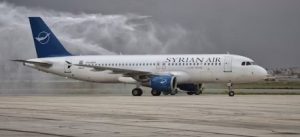
A Syrian Air plane at Aleppo International Airport, after it officially reopened in March. EPA
Syria’s national carrier Syrian Air will resume direct flights to Dubai and Sharjah from Sunday, April 20, as part of an “exceptional first phase”, as the country seeks to revive its aviation sector.
Flights will operate between Damascus and Dubai four times a week, on Mondays, Wednesdays, Thursdays and Saturdays. The airline aims to increase that to daily flights soon, it said in a Facebook post on Thursday.
The airline said it was working “to add more flights as soon as possible, once we receive the necessary approvals from the relevant authorities”.
The move comes after the UAE’s General Civil Aviation Authority announced the resumption of flights between the Emirates and Syria on April 14.
The GCAA said the countries are coordinating to restart flights between them “in a manner that enhances air traffic and supports passenger and cargo movement”.
This decision came after Syrian President Ahmad Al Shara visited the UAE on Sunday for the first time since taking office.
Countries had suspended flights to and from Syria during the civil war, but some airlines have resumed services since the toppling of former president Bashar Al Assad in December.
Turkish Airlines resumed flights to Damascus on January 23, while Qatar Airways restarted on January 7.

However, Syria’s long-neglected aviation sector will need infrastructure investment, along with the easing of sanctions, to attract more international airlines and meet growing travel demand, Kamil Al Awadhi, regional vice president of Africa and the Middle East at the International Air Transport Association, told The National.
The country’s aviation capabilities are currently stuck at the same level as the 1980s following more than a decade of “neglect” since the civil war began in 2011, he said.
“There’s big demand internationally to operate in and out of Syria,” Mr Al Awadhi said on the sidelines of the Iata World Cargo Symposium in Dubai.
“There’s only a certain amount of capacity now that can be handled with the current infrastructure. There’s years of neglect of human capital and the level of know-how in Syria falls short of international standards.”
Mr Al Awadhi, who met with Syria’s civil aviation authority officials two months ago, said the sector’s short-term needs include support with more ground equipment, airport technology, radar, infrastructure, expertise and safety programmes.
Iata can provide capacity-building and training, as well as assist in bringing civil aviation to international standards and advising on procedures and regulations, Mr Al Awadhi said.
“The primary obstacle is a return to normality in Syria; you need that to promote international flights. If there are sanctions and no infrastructure, you won’t get European airlines bouncing back in,” he said. “It’s a chicken-and-egg situation.”
Travel demand for Syria is strong but can also be “really bad” depending on “how the leadership moves” to ensure stability and security in the country.
“If they establish law and order, then for sure aviation will hit numbers in Syria that have never been seen before, but if there is no stability and no vision, then aviation won’t grow as well as it should,” the IATA regional executive said.
In March, the International Civil Aviation Organisation and Syria’s General Authority for Civil Aviation signed an agreement that aims to “modernise Syria’s aviation infrastructure and capabilities to safely and securely rejoin the global air transport network”, the UN aviation body said.
ICAO will “actively engage” with donor states and international organisations to mobilise the necessary financial and technical support, it said last month.
“Securing these resources will be instrumental in ensuring the successful implementation of this initiative and driving long-term sustainability in Syria’s aviation sector,” it added.
*The National.*




